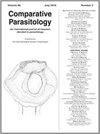Eimeria albigulae (Apicomplexa: Eimeriidae): New Host and Distributional Record from the Bryant's Woodrat, Neotoma bryanti (Rodentia: Cricetidae), from California, U.S.A.
IF 0.4
4区 医学
Q4 PARASITOLOGY
引用次数: 0
Abstract
ABSTRACT: Fecal samples, collected in July 2020 and April–May 2021 from 17 Bryant's woodrats, Neotoma bryanti Merriam, from 3 sites in San Diego, Orange, and San Bernardino counties, California, were examined for coccidial parasites. Three of 8 (38%) woodrats from a single site in San Diego County were found to be passing oocysts of Eimeria albigulae Levine, Ivens, and Kruidenier, 1957. Subspheroidal oocysts measured (average length [L] × width [W]) 23.5 × 21.4 µm with an average L/W ratio of 1.1. A micropyle was absent, but an oocyst residuum as well as a single polar granule was present. Ovoidal sporocysts measured (average L × W) 10.1 × 7.5 µm with an L/W ratio average of 1.4. A nipple-like Stieda body was present, but sub-Stieda and para-Stieda bodies were absent. The sporocyst residuum was composed of loosely packed granules between and around the sporozoites. This woodrat represents the sixth host to harbor this coccidian. We document a new host as well as a geographic distribution record for E. albigulae.白纹Eimeria albigulae(Apicocomplexa:Eimeridae):来自美国加利福尼亚州布赖恩特伍德鼠的新宿主和分布记录。
摘要:2020年7月和2021年4-5月,从加利福尼亚州圣地亚哥、奥兰治和圣贝纳迪诺县的3个地点采集了17只Bryant’s Woodrat,即Neotoma bryanti Merriam的粪便样本,对其进行了球虫寄生虫检查。1957年,在圣地亚哥县的一个地点,发现8只(38%)家鼠中有3只正在经过白纹艾美耳球虫Levine、Ivens和Kruedenier的卵囊。测量到的亚信息素卵囊(平均长度[L]×宽度[W])23.5×21.4µm,平均L/W比为1.1。没有微孔,但存在卵囊残留物和单个极性颗粒。卵圆形孢子囊(平均长×宽)10.1×7.5µm,长宽比平均为1.4。乳头状Stieda体存在,但不存在亚Stieda体和副Stieda体。孢子囊残留物由孢子之间和孢子周围松散堆积的颗粒组成。这只林鼠代表了第六个携带这种球虫的宿主。我们记录了E.albigulae的新宿主以及地理分布记录。
本文章由计算机程序翻译,如有差异,请以英文原文为准。
求助全文
约1分钟内获得全文
求助全文
来源期刊

Comparative Parasitology
医学-动物学
CiteScore
1.00
自引率
0.00%
发文量
16
审稿时长
>12 weeks
期刊介绍:
Comparative Parasitology (continuing the Journal of the Helminthological Society of Washington in its 67th volume) focuses on parasitological research of a comparative nature, emphasizing taxonomy, systematics, ecology, biogeography, evolution, faunal survey, and biological inventory within a morphological and/or molecular context. The scope of Comparative Parasitology extends to all parasitic faunas, including helminths, protistans and arthropods.
 求助内容:
求助内容: 应助结果提醒方式:
应助结果提醒方式:


